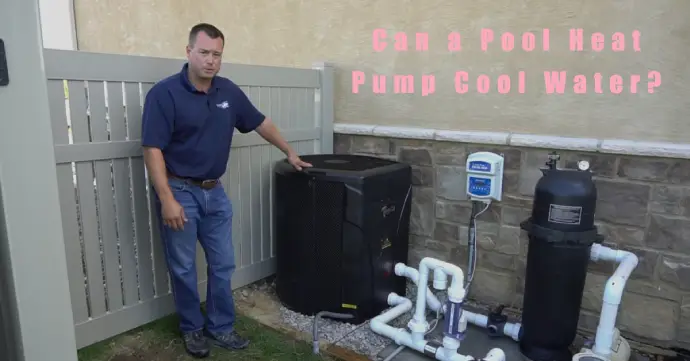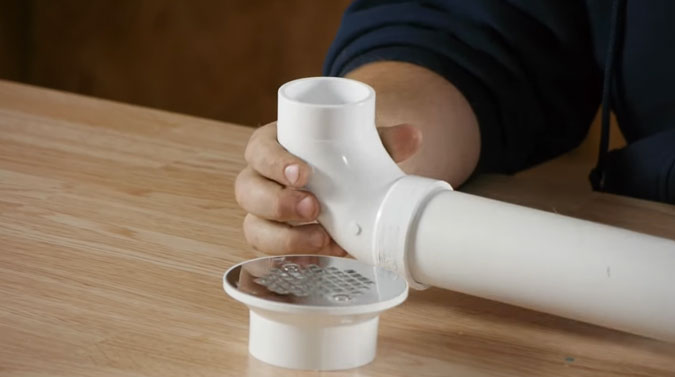Last Updated on June 10, 2023
A dip in the pool is often the best solution for beating the heat during summer. But pool heat pumps come in when the water temperature rises to uncomfortable levels. These devices are ideal for maintaining an optimal pool temperature in colder regions.
However, a common misconception is that they can only heat the water. It might surprise you to find out that these pumps can cool water too. This is especially helpful during hot summers or when the water temperature reaches scorching levels.
Discover the untapped potential of pool heat pumps for cooling water – benefits and key performance factors explored.
What Are the Benefits of Cooling the Pool With a Heat Pump?

Cooling a pool with a heat pump offers several benefits, including an extended swimming season, cost savings, and environmental friendliness.
One: Extended Swimming Season
The utilization of a specialized device enables the prolongation of the period during which swimming can be enjoyed. A pool heat pump is one such device that can extend the swimming season by cooling the pool water during hot summer days.
This function is particularly useful in regions with high ambient air temperatures, as it allows pool users to enjoy cooler waters during the scorching summer months. Besides extending the swimming season, cooling the pool water with a heat pump also offers other benefits.
It can help maintain a comfortable water temperature, ideal for exercise, relaxation, and other aquatic activities. Additionally, it can reduce the growth of algae and bacteria that thrive in warm waters, thus improving the overall cleanliness and hygiene of the pool.
Two: Cost Savings
Installing an energy-efficient device like a pool heat pump can lead to long-term financial benefits. Although the initial investment is higher than traditional gas pool heaters, the operating costs of heat pumps are significantly lower. This means pool owners can save money on utility bills over time.
Heat pumps reduce reliance on gas or electricity, making them an environmentally friendly option. Proper maintenance is key to extending the lifespan of heat pump pool heaters. With regular upkeep, heat pumps can last longer than gas pool heaters, resulting in even greater cost savings in the long run.
Three: Environmentally Friendly
Consider using a pool heat pump if you are looking for a cost-effective and environmentally friendly method of heating and cooling your pool. Unlike gas heaters, pool heat pumps don’t burn fossil fuels directly, making them a more sustainable option.
They also rely on renewable energy sources like solar and wind power to generate heat. Moreover, pool heat pumps consume less energy because they extract heat from the surrounding air. With these energy-efficient features, you can enjoy a heated pool luxury without worrying about the environmental impact.
Four: Precise Temperature Control
Heat pumps maintain pool water temperature using a precise thermostat that controls the compressor and fan. This thermostat maintains the temperature within a half-degree Celsius, allowing pool owners complete control over their pool’s temperature.
This feature is especially important for competitive swimmers as small temperature fluctuations can affect their performance. Heat pumps can reverse the refrigeration cycle during hot summer months to cool the water, making swimming more comfortable.
Five: Ease of Use and Control
Modern pool heat pumps are user-friendly and efficient. They come with digital displays, programmable timers, and advanced control features. These pumps allow pool owners to customize heating schedules and reduce energy costs.
With digital displays and programmable timers, pool owners can set the temperature in advance, making it more convenient when they’re away from home. Advanced control features like automatic defrost, self-diagnostic capabilities and smart thermostats enhance comfort and energy efficiency.
Thanks to their user-friendly controls, regardless of technical expertise, these pumps can be operated by anyone. They can also be remotely controlled via mobile apps, allowing pool owners to manage their swimming environment easily.
What Is the Reason That the Heat Pump Does Not Cool the Pool?

When a heat pump fails to cool a pool, several factors may be responsible for the problem. Some of them are listed below:
ONE: Incorrect Thermostat Settings
The thermostat must be configured properly to ensure a pool heat pump operates correctly. Incorrect thermostat settings are a common reason why a pool heat pump may not be cooling the water. Set the thermostat to cooling mode to cool the pool water and select the desired temperature.
Confirming that the thermostat is not in heat mode is crucial, as this would prevent the heat pump from producing cool water. Different heat pump models may have varying configurations, so checking the manufacturer’s instructions is important.
Checking the thermostat settings is the first step in troubleshooting a pool heat pump that is not cooling the water.
TWO: Dirty or Clogged Filters
Dirty or clogged filters can contribute to poor cooling performance in pool heat pumps. Regular maintenance of the filters is essential for optimal operation of heat pumps. Debris and particles can accumulate in the filters over time, obstructing proper airflow and reducing cooling efficiency.
Consequently, the heat pump’s compressor works harder than necessary, increasing energy consumption and leading to higher electricity bills. Reduced airflow can also cause the heat pump’s evaporator coil to freeze, further hindering its cooling ability.
Note: Every one to three months, pool owners should change or clean their filters to ensure their heat pumps work well.
THREE: Outdoor Unit Obstruction
To maintain the proper functioning of a heat pump’s outdoor unit, keeping its immediate vicinity free of obstructing debris and vegetation is crucial. Such obstructions can greatly hinder its ability to cool pool water effectively.
Debris buildup can restrict airflow, causing overheating and malfunction, leading to poor performance and reduced system lifespan. Regular maintenance and cleaning are necessary to prevent obstruction and ensure free airflow.
It is necessary to keep the surrounding area free of potential obstacles blocking the airflow. Adequate airflow is crucial for optimal pool water cooling, and proper outdoor unit maintenance is essential for optimal heat pump function.
FOUR: Dirty Outdoor Coils
Regular upkeep of outdoor coils is crucial for optimal cooling performance and energy conservation, leading to cost savings and environmental benefits. The heat transfer process becomes less efficient if dirt and debris block the airflow, which makes the heat pump work harder and consume more energy.
Dirty coils can cause the heat pump to operate under more challenging circumstances, decreasing its lifespan.
To clean the coils, it’s crucial to stop the heat pump’s power and remove debris by hand or with a specialized vacuum. After eliminating the debris, scrub the coils gently with a coil cleaner and soft brush. Rinse the coils entirely with water and allow them to dry before turning the power back on.
Note: It is advisable to hire a skilled HVAC technician who can thoroughly clean the coils without causing any damage to the system.
What temperature is too cold for a pool heat pump?

Most pool heat pumps stop functioning when the temperature drops below 55°F. However, some advanced models can still operate from the mid to low temperatures. A heat pump’s effectiveness depends on several factors, including its size and type, the pool’s size and temperature, and the climate in the area.
It is crucial to consult a professional installer or manufacturer to verify the appropriate operating temperature range for a pool heat pump. Avoid operating a heat pump at too cold temperatures, which can harm the unit and reduce its lifespan.
Note: With advanced technologies like scroll compressors and variable-speed fans, some expensive models can heat swimming pools at low temperatures without sacrificing performance.
What is the average running time of the pool heat pump?
Experts suggest running a pool heat pump for about eight hours daily, but this can change based on several factors. The size of the pool, desired temperature increase, and outdoor temperature may impact the heat pump’s running time.
Larger pools need more time to heat up than smaller ones, and colder outdoor temperatures require more energy and time to heat up the pool water. Following the manufacturer’s instructions and consulting with a professional is crucial in determining the best running time for your pool heat pump.
Maintenance and upkeep improve the machine’s efficiency and prolong its lifespan, resulting in long-term savings.
Is it necessary to run the pool pump during freezing weather?
During freezing weather, it’s necessary to run the pool pump to prevent ice formation that could harm the pool’s components. To achieve this, filtration and auxiliary pumps equipped with freeze guards should properly function to ensure continuous water flow.
Freeze guards can activate the pumps when the outside temperature drops, which helps to prevent water from freezing. Running the pool heater is unnecessary since the water is unlikely to freeze when it’s moving, and the heat pump helps to maintain a comfortable water temperature.
There must be more than freeze guards, though – proper insulation around the pool and its components is essential. You should run your pool pump continuously during freezing weather to avoid standing water freezing.
Versatile Heat Pumps: Heating and Cooling Water

Installing a pool heat pump can have advantages such as enhancing the swimmers’ comfort and reducing algae growth. Although these pumps are mostly designed to heat swimming pool water, they can also cool it.
A certain temperature threshold may reduce the efficiency of the cooling function. The duration of the pump’s operation depends on various factors, including pool size and desired water temperature. Still, running the pump between 8 and 12 hours every day is generally advised.
The pool pump must work continually in harsh winter weather to prevent equipment and plumbing damage. Owners of heat pumps should be mindful of these limitations to optimize performance.
By carefully monitoring the pump’s temperature, running time, and maintenance, pool owners can provide swimmers with a comfortable and enjoyable experience.


